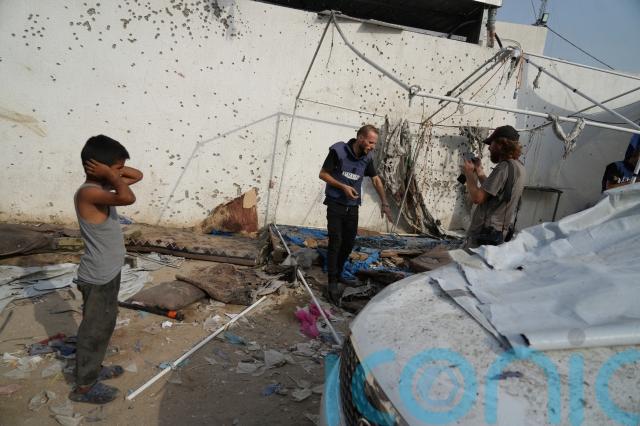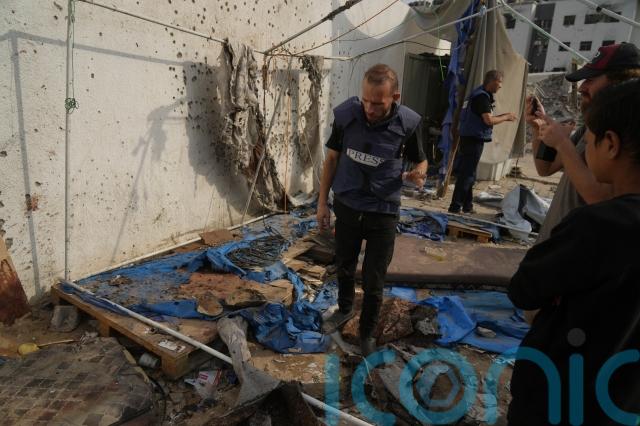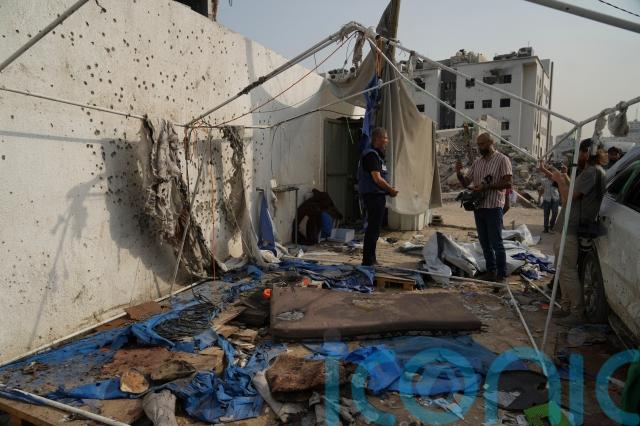
Israel’s military has targeted a prominent Al Jazeera correspondent with an air strike, killing him, another journalist and at least six other people.
Anas al-Sharif and his Al Jazeera colleague Mohamed Qreiqeh were among those killed while sheltering outside the Gaza City Hospital complex late on Sunday.
Officials at Shifa Hospital confirmed the deaths and said the strike also killed four other journalists and two other people. It also damaged the entrance to the hospital complex’s emergency building.
Israel’s military described Mr al-Sharif as the leader of a Hamas cell – an allegation that Al Jazeera and Mr al-Sharif had previously dismissed as baseless.
The incident marked the first time during the war that Israel’s military has swiftly claimed responsibility after a journalist was killed in a strike.

It came less than a year after Israeli army officials first accused Mr al-Sharif and other Al Jazeera journalists of being members of the militant groups Hamas and Islamic Jihad. In a July 24 video, Israel’s army spokesman Avichay Adraee attacked Al Jazeera and accused Mr al-Sharif of being part of Hamas’s military wing.
Al Jazeera called the strike a “targeted assassination” and accused Israeli officials of incitement, connecting Mr al-Sharif’s death to the allegations that both the broadcaster and correspondent had denied.
“Anas and his colleagues were among the last remaining voices from within Gaza, providing the world with unfiltered, on-the-ground coverage of the devastating realities endured by its people,” Al Jazeera said in a statement.

Apart from rare invitations to observe Israeli military operations, international media have been barred from entering Gaza for the duration of the war. Al Jazeera is among the few outlets still fielding a big team of reporters inside the besieged strip, chronicling daily life amid air strikes, hunger and the rubble of destroyed neighbourhoods.
The broadcaster has suffered heavy losses during the war, including 27-year-old correspondent Ismail al-Ghoul and cameraman Rami al-Rifi, killed last summer, and freelancer Hossam Shabat, killed in an Israeli air strike in March.
Like Mr al-Sharif, Mr Shabat was among the six that Israel accused of being members of militant groups last October.
Hundreds of people, including many journalists, gathered on Monday to mourn Mr al-Sharif, Mr Qreiqeh and their colleagues.
Mr al-Sharif reported a nearby bombardment minutes before his death. In a social media post that Al Jazeera said was written to be posted in case of his death, he bemoaned the devastation and destruction that war had wrought and bid farewell to his wife, son and daughter.
“I never hesitated for a single day to convey the truth as it is, without distortion or falsification,” the 28-year-old wrote.
The journalists are the latest to be killed in what observers have called the deadliest conflict for journalists in modern times. The Committee to Protect Journalists said on Monday that at least 192 journalists have been killed in Gaza.
Mr al-Sharif began reporting for Al Jazeera a few days after war broke out. He was known for reporting on Israel’s bombardment in northern Gaza, and later for the starvation gripping much of the territory’s population.
Mr Qreiqeh, a 33-year-old Gaza City native, is survived by two children.
Both journalists were separated from their families for months earlier in the war. When they managed to reunite during the ceasefire earlier this year, their children appeared unable to recognise them, according to video footage they posted at the time.

In a July broadcast he cried on air as a woman behind him collapsed from hunger.
“I am talking about slow death of those people,” he said at the time.
Al Jazeera is blocked in Israel and soldiers raided its offices in the occupied West Bank last year, ordering them to close.
Mr al-Sharif’s death comes weeks after the New York-based Committee to Protect Journalists said Israel had targeted him with a smear campaign.
Irene Khan, the UN special rapporteur on freedom of expression, on July 31 said that the killings were “part of a deliberate strategy of Israel to suppress the truth, obstruct the documentation of international crimes and bury any possibility of future accountability”.
The Committee to Protect Journalists said on Sunday that it was appalled by the strike.
“Israel’s pattern of labelling journalists as militants without providing credible evidence raises serious questions about its intent and respect for press freedom,” Sara Qudah, the group’s regional director, said.
Subscribe or register today to discover more from DonegalLive.ie
Buy the e-paper of the Donegal Democrat, Donegal People's Press, Donegal Post and Inish Times here for instant access to Donegal's premier news titles.
Keep up with the latest news from Donegal with our daily newsletter featuring the most important stories of the day delivered to your inbox every evening at 5pm.